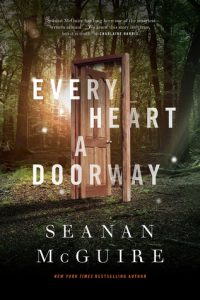Magical Boarding Schools are not exactly my kind of thing. When characters in stories have to go to school, I tend to skip whole passages, unless it’s Jo Walton’s Morwenna in Among Others, who hates her school experience in a very relatable and well-narrated way.
So I was genuinely surprised when I came upon Seanan McGuire’s Every Heart a Doorway in my Hugo readings and began to feel this novella was written for me.
 Its main emotion is longing, an unhealthy and absurd longing not to live in this world anymore. It’s the main motivation of every student in Eleanor West’s Home for Wayward Children, because everyone of the girls (and very few boys) there has once been lost, following a path to another world, and now all they want is to go back there, where they feel they truly belong.
Its main emotion is longing, an unhealthy and absurd longing not to live in this world anymore. It’s the main motivation of every student in Eleanor West’s Home for Wayward Children, because everyone of the girls (and very few boys) there has once been lost, following a path to another world, and now all they want is to go back there, where they feel they truly belong.
Or so they say.
Their parents see another story, of troubled young minds and traumatised kids they can’t reach anymore.
There are so many layers and ways to read Every Heart a Doorway: is it a metaphor about growing up and leaving childhood dreams behind? Does it tackle mental illness and trauma? Or is it a fairytale, where special children are called to other worlds?
It is, first and foremost, acknowledging that people have very different needs. Some will never fit in, and they will break under the expectations and demands of the world. Unless someone offers them a place to be themselves, and that’s what Eleanor West (whose own story is one of the heartbreaking moments of this novella) does.
But her small bubble of inclusion is threatened when students start to get murdered. The whodunit part of Every Heart a Doorway is not its main feature, though – it’s the diverse and varied bunch of characters and their stories instead. That’s why the murders hit so hard; they show very clearly the stories that are left unfinished. From goth-like, fascinated by death Nancy to wannabe mad scientist Jack, these characters are somewhat quirkier than your standard magical boarding school students.
I’m still not sure what to think about the ending. It was a little bit anticlimatic, so very easy, and it seemed to narrow down the story and to factor out some severe implications. Discussing it with a friend, I found it could still be ambiguous, Pan’s Labyrinth style. If anybody wants to know more or discuss, I’ll write some spoiler-y thoughts in the comments section.
Every Heart a Doorway starts the Wayward Children series, and I’m also not sure I needed to know more, because it was pretty self-contained. But I’m willing to get surprised once more.

Miss Navigator
+++Spoilers+++
In the end, Nancy is very sure she wants to leave this world, the world she never fit in, and go to her beloved Land of the Dead. And so she does. Thinking of her maybe-eating-disorder and her fascination with stillness, while she’s calming her heartbeat ever more … well, it’s your guess what happened. EVERY HEART A DOORWAY goes to some lengths to establish the truth of the otherworld experiences (for example with the spider queen tale). But in the very beginning, it also stresses that we use narration to make sense of things that are inherently irrational. Like the death of a young woman? Either way, to this world, she is dead. And the controversial nature of this death or “death” could be seen as being glossed over. I found comfort in the way it is told, but I imagine it could lead to consternation in others.
+++spoilers end+++